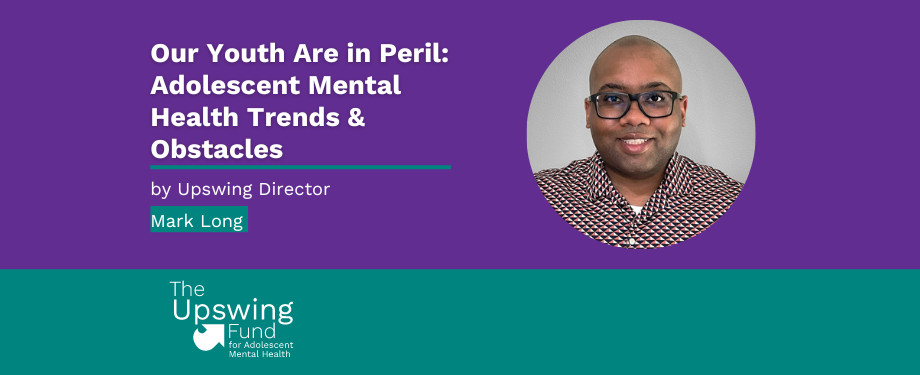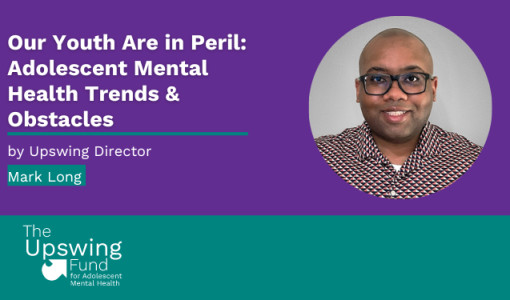

October 26, 2022 | Articles
Our Youth Are in Peril: Adolescent Mental Health Trends and Obstacles
Submission by Dr. Mark Long, Director, The Upswing Fund for Adolescent Mental Health
With World Mental Health Day taking place earlier in October, our team has taken some time to reflect on the past two years of our work at The Upswing Fund. We would like to share trends that give us hope, obstacles that keep us up at night, and ways we can work together to address the adolescent mental health crisis.
And make no mistake – adolescent mental health continues to be a national emergency more than a year after leading experts declared it as such. This month, more than 130 national and state children’s groups called on the Biden administration to acknowledge this reality by issuing an emergency declaration on the state of youth mental health.
Anyone who has spoken to young people in the past few years can see it forthrightly but the latest statistics confirm a staggering increase in stress, depression, isolation, and anxiety for young people. Their formative years have been forever marked by COVID-19 and all the associated instability and uncertainty. More than ever, youth of color and LGBTQ+ youth need to be able to access mental health care and affirming, culturally responsive services.
Three trends that give us hope…
Fortunately, we’ve started seeing momentum on these issues, including:
1. The expansion of culturally responsive care
Our partners are leading initiatives and providing support for youth of color and LGBTQ+ youth that meet them where they’re at. These services are provided to youth and their families in ways that affirm their identities. For examples on how our partners are providing culturally responsive care, check out our September 2021 report, starting on page 20.
2. The reduction of stigma among youth and growing recognition of the crisis
One great example of increased recognition is a first-of-its-kind report, State of Mental Health for Youth of Color, released by our partners at The AAKOMA Project this summer. Thanks to our grantee partners, we are noticing that storytelling by youth is becoming more public, including in mainstream news and entertainment outlets.
3. Increased federal commitments to fund enhanced mental health services in schools and in health clinics
President Joe Biden announced funding to expand certified community behavioral health clinics as part of the Administration’s commitment to tackling the mental health crisis and previewed that additional resources will be announced in the coming weeks to support mental health workers and help communities strength mental health. However, as we reported earlier this summer, while recent legislation broadly increases funding for youth mental health, these increases rarely provide support for community-based organizations.
Three obstacles that keep us up at night…
There are still plenty of challenges and causes for concern, including:
1. Rural LGBTQ+ youth aren’t getting the support they need
In a November 2021 report from our partners at The Trevor Project, nearly half of LGBTQ+ youth in rural areas and small towns stated that their community was somewhat or very unaccepting of LGBTQ+ people, compared to just over a quarter of those in urban and suburban areas.
2. Self-harm among young people is a growing concern in recent years
Suicide is one of the top three leading causes of death among young people ages 10-24 in the U.S.* Specifically, The Trevor Project’s 2022 National Survey on LGBTQ Youth Mental Health reported that LGBTQ youth who live in a community that is accepting of LGBTQ people reported significantly lower rates of attempting suicide than those who do not.
3. Racial trauma and tensions continue to impact adolescents
The AAKOMA Project's report highlights that youth of color are disproportionately impacted by racism and discrimination. In the past year, 42.1% of Youth of Color were exposed to at least one source of racial trauma – from peers, parents, caregivers, police, teachers, employers, and/or the media. As the report states, “We cannot ignore the impacts of racial trauma on the mental health of Youth of Color.”
And two ways we can work together to address this crisis
Systemic challenges like the adolescent mental health crisis require us to work together on solutions, including:
Donate to community centers providing services to youth of color and LGBTQ+ youth
We’re proud to have partnered with 92 community-based organizations since our launch in 2020 that are providing affirming and culturally responsive care to youth across the country. If you’re ready to respond to the youth mental health crisis, check out our list of partners to find an organization in your area, or one with a mission close to your heart. Whether it’s your time or financial resources, know that every little bit of assistance helps.
Get in touch with us!
If you are interested in supporting Upswing’s community of partners and learning about advancements, challenges, and needs across the broader adolescent mental health ecosystem, we’d love to speak to you. We work together with philanthropists, corporations, and community members who share our commitment to a system of care that is both accessible and equitable for ALL youth.
On a personal note:
This work is very dear to my heart as I can relate to living with limited support and not having discussions about mental health or access to care when I was a child. I am very open in discussing what it is like living in a society where people stereotype you, put you down, and take advantage of your vulnerability. I speak for many youths that experience trauma due to their own identities. I would be so honored if you would join us on this journey to make a difference and support the millions of youths that are counting on us to combat this mental health crisis. To learn more about The Upswing Fund, please reach out to us at [email protected].
As we near the end of 2022, we look forward to continuing our work to increase access to care for marginalized youth well into the new year.
* If you or someone you know is struggling with their mental health, help is available. Call or text 988, or chat 988lifeline.org to reach the 988 Suicide & Crisis Lifeline or call the National Mental Health Hotline at 866-903-3787.


